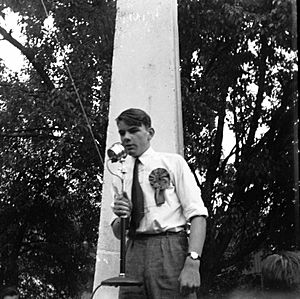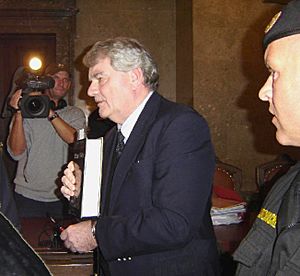David Irving facts for kids
Quick facts for kids
David Irving
|
|
|---|---|

Irving in 2012
|
|
| Born | 24 March 1938 Hutton, Essex, England |
| Occupation |
|
| Language |
|
| Education | Brentwood School, Essex |
| Alma mater | |
| Years active | 1962–present |
| Notable works |
|
| Spouse |
María del Pilar Stuyck
(m. 1961; div. 1981) |
| Partner | Bente Hogh (since 1992) |
| Children | 5 |
David John Cawdell Irving (born 24 March 1938) is an English author who has written on the military and political history of World War II, especially Nazi Germany. He was found to be a Holocaust denier in a UK court in 2000 as a result of a failed libel case.
Irving's works include The Destruction of Dresden (1963), Hitler's War (1977), Churchill's War (1987) and Goebbels: Mastermind of the Third Reich (1996). In his works, he argued that Adolf Hitler did not know of the extermination of Jews, or, if he did, he opposed it. His 1964 book The Mare's Nest about Germany's V-weapons campaign of 1944–45 was praised for its deep research but criticised for minimising Nazi slave labour programmes.
By the late 1980s, Irving had placed himself outside the mainstream of the study of history, and had begun to turn from "'soft-core' to 'hard-core' Holocaust denial", possibly influenced by the 1988 trial of Holocaust denier Ernst Zündel. That trial, and his reading of the pseudoscientific Leuchter report, led him to openly espouse Holocaust denial, specifically denying that Jews were murdered by gassing at the Auschwitz concentration camp.
Irving's reputation as a historian was further discredited in 2000, when, in the course of an unsuccessful libel case he filed against the American historian Deborah Lipstadt and Penguin Books, High Court Judge Charles Gray determined in his ruling that Irving willfully misrepresented historical evidence to promote Holocaust denial and whitewash the Nazis, a view shared by many prominent historians. The English court found that Irving was an active Holocaust denier, antisemite and racist, who "for his own ideological reasons persistently and deliberately misrepresented and manipulated historical evidence". In addition, the court found that Irving's books had distorted the history of Hitler's role in the Holocaust to depict Hitler in a favourable light.
Contents
Early life
David Irving and his twin brother Nicholas were born in Hutton, near Brentwood, Essex, England. They had a brother, John, and a sister, Jennifer. Their father, John James Cawdell Irving (1898–1967), was a career naval officer and a commander in the Royal Navy. Their mother, Beryl Irving (née Newington), was an illustrator and a writer of children's books.
During World War II, Irving's father was an officer aboard the light cruiser HMS Edinburgh. On 30 April 1942, while escorting Convoy QP 11 in the Barents Sea, the ship was badly damaged by the German submarine U-456. Two days later, the ship was attacked by a surface craft, and now beyond recovery was abandoned and scuttled by a torpedo from HMS Foresight. Irving's father survived but severed all links with his wife and children after the incident.
Irving described his childhood in an interview with the American writer Ron Rosenbaum as: "Unlike the Americans, we English suffered great deprivations ... we went through childhood with no toys. We had no kind of childhood at all. We were living on an island that was crowded with other people's armies". According to his brother, Nicholas, David has been a provocateur and prankster since his youth. Nicholas Irving has said that "David used to run toward bombed out houses shouting 'Heil Hitler!'", a statement which Irving denies.
Irving went on to say to Rosenbaum that his negationist views about World War II dated to his childhood, particularly due to his objections to the way Adolf Hitler was portrayed in the British media during the war. Irving asserted that his sceptical views about the Third Reich were rooted in his doubts about the cartoonist caricatures of Hitler and the other Nazi leaders published in the British wartime press.
Student years
After completing A levels at Brentwood School, Irving studied for a physics degree at Imperial College London, leaving after the first year. He did not complete the course because of financial constraints.
Irving later studied for two years toward a degree in Economics in the department of Political Economy at University College London. He again had to drop out due to lack of funds. During this period at university, he participated in a debate on Commonwealth immigration, seconding British Union of Fascists founder Sir Oswald Mosley.
Irving tried to join the Royal Air Force but was deemed to be medically unfit.
After serving in 1959 as editor of the University of London Carnival Committee's journal, instead of doing national service, Irving left for West Germany, where he worked as a steelworker in a Thyssen AG steel works in the Ruhr area and learned the German language. He then moved to Spain, where he worked as a clerk at an air base.
By 1962, Irving was engaged to write a series of 37 articles on the Allied bombing campaign, Und Deutschlands Städte starben nicht ("And Germany's Cities Did Not Die"), for the German boulevard journal Neue Illustrierte. These were the basis for his first book, The Destruction of Dresden (1963), in which he examined the Allied bombing of Dresden in February 1945. By the 1960s, a debate about the morality of the carpet bombing of German cities and civilian population had already begun, especially in the United Kingdom. There was consequently considerable interest in Irving's book, which was illustrated with graphic pictures, and it became an international best-seller.
Subsequent works
After the success of the Dresden book, Irving continued writing, including some works of negationist history, although his 1964 work The Mare's Nest – an account of the German V-weapons programme and the Allied intelligence countermeasures against it – was widely praised when published and continues to be well regarded. Michael J. Neufeld of the Smithsonian's National Air and Space Museum has described The Mare's Nest as "the most complete account on both Allied and German sides of the V-weapons campaign in the last two years of the war."
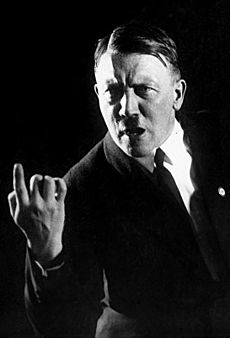
Irving translated the Memoirs of Field Marshal Wilhelm Keitel in 1965 (edited by Walter Görlitz) and in 1967 published Accident: The Death of General Sikorski.
Also in 1967, Irving published two more works: The Virus House, an account of the German nuclear energy project for which Irving conducted many interviews, and The Destruction of Convoy PQ-17, in which he blamed British escort group commander Commander Jack Broome for the catastrophic losses of the Convoy PQ 17. Amid much publicity, Broome sued Irving for libel in October 1968, and in February 1970, after a 17-day-trial before London's High Court, Broome won. Irving was forced to pay £40,000 in damages, and the book was withdrawn from circulation.
After PQ-17, Irving largely shifted to writing biographies. In 1968, he published Breach of Security, an account of German reading of messages to and from the British Embassy in Berlin before 1939 with an introduction by the British historian Donald Cameron Watt. As a result of Irving's success with Dresden, members of Germany's extreme right wing assisted him in contacting surviving members of Hitler's inner circle. In an interview with the American journalist Ron Rosenbaum, Irving claimed to have developed sympathies towards them. Many ageing former mid- and high-ranked Nazis saw a potential friend in Irving and donated diaries and other material. Irving described his historical work to Rosenbaum as an act of "stone-cleaning" of Hitler, in which he cleared off the "slime" that he felt had been unjustly applied to Hitler's reputation.
In 1969, during a visit to Germany, Irving met Robert Kempner, one of the American prosecutors at the Nuremberg trials. Irving asked Kempner if the "official record of the Nuremberg Trials was falsified", and told him that he was planning to go to Washington, D.C., to compare the sound recordings of Luftwaffe Field-Marshal Erhard Milch's March 1946 evidence with the subsequently published texts to find proof that evidence given at Nuremberg was "tampered with and manipulated". Upon his return to the United States, Kempner wrote to J. Edgar Hoover, the director of the FBI, that Irving expressed many "anti-American and anti-Jewish statements".
In 1971, Irving translated the memoirs of General Reinhard Gehlen, and in 1973 published The Rise and Fall of the Luftwaffe, a biography of Field Marshal Milch. He spent the remainder of the 1970s working on Hitler's War and The War Path, his two-part biography of Adolf Hitler; The Trail of the Fox, a biography of Field Marshal Erwin Rommel; and a series in the Sunday Express describing the Royal Air Force's famous Dam Busters raid. In 1975, in his introduction to Hitler und seine Feldherren, the German edition of Hitler's War, Irving attacked Anne Frank's diary as a forgery, claiming falsely that a New York court had ruled that the diary was really the work of American scriptwriter Meyer Levin "in collaboration with the girl's father".
Revisionism
Hitler's War

In 1977, Irving published Hitler's War, the first of his two-part biography of Adolf Hitler. Irving's intention in Hitler's War was to clean away the "years of grime and discoloration from the facade of a silent and forbidding monument" to reveal the real Hitler, whose reputation Irving argued had been slandered by historians. In Hitler's War, Irving tried to "view the situation as far as possible through Hitler's eyes, from behind his desk". He portrayed Hitler as a rational, intelligent politician, whose only goal was to increase Germany's prosperity and influence on the continent, and who was constantly let down by incompetent or treasonous subordinates. Irving's book faulted the Allied leaders, especially Winston Churchill, for the eventual escalation of war, and argued that the German invasion of the Soviet Union in 1941 was a "preventive war" forced on Hitler to avert an impending Soviet attack. Irving also argued that Hitler had no knowledge of the Holocaust: while not denying its occurrence, he argued that SS leader Heinrich Himmler and his deputy Reinhard Heydrich were its originators and architects. Irving made much of the lack of any written order from Hitler ordering the Holocaust; he offered to pay £1,000 to anyone who could find such an order. As of 2019[update], his offer still stood.
In Hitler's War, Irving quoted a 1942 memorandum by Hans Lammers, the Chief of the Reich Chancellery, to the Reich Justice Minister Franz Schlegelberger, saying: "the Führer has repeatedly pronounced that he wants the solution of the Jewish Question put off until after the war is over". Irving took this as proof that Hitler ordered against the extermination of the Jews. He falsely claimed that "no other historians have quoted this document, possibly finding its content hard to reconcile with their obsessively held views" about Hitler's responsibility for the Holocaust. However, the interpretation of the document is not as simple as Irving made it out to be in his book. The memorandum has no date and no signature on it, although historians estimate that it was issued at some point between 1941 and 1942 by looking at the other documents where the memorandum is located. They have concluded that the memorandum was more than likely from late 1941 when Hitler was still advocating the expulsion of the Jews, rather than later when he advocated their extermination.
Critical reaction to Hitler's War was generally negative. Reviewers took issue with Irving's factual claims as well as his conclusions. For example, American historian Charles W. Sydnor Jr. noted numerous errors, such as Irving's unreferenced statement that the Jews who fought in the Warsaw Ghetto Uprising of 1943 were well supplied with weapons from Germany's allies. Sydnor pointed out that Hitler had received an SS report in November 1942 which contained a mention of 363,211 Russian Jews executed by the Einsatzgruppen between August and November 1942. Sydnor remarked that Irving's statement that the Einsatzgruppen were in charge in the death camps seems to indicate that he was not familiar with the history of the Holocaust, as the Einsatzgruppen were in fact mobile death squads who had nothing to do with the death camps.
Irving's work in the late 1970s and early 1980s
Months after the release of Hitler's War, Irving published The Trail of the Fox, a biography of Field Marshal Erwin Rommel.
In 1978, Irving released The War Path, the companion volume to Hitler's War which covered events leading up to the war and which was written from a similar point of view. Again, professional historians such as Donald Cameron Watt noted numerous inaccuracies and misrepresentations. Despite the criticism, the book sold well, as did all of Irving's books up to that date. The success of his books enabled Irving to buy a home in the prestigious Mayfair district of London, own a Rolls-Royce car and enjoy an affluent lifestyle. In addition, Irving, despite being married, became increasingly open about his affairs with other women, all of which were detailed in his self-published diary. Irving's affairs caused his first marriage to end in divorce in 1981.
In the 1980s, Irving started researching and writing about topics other than Nazi Germany, but with less success. He began his research on his three-part biography of Winston Churchill. After publication Irving's work on Churchill received at least one bad review from Professor David Cannadine (then of the University of London):
It has received almost no attention from historians or reviewers ... It is easy to see why ... full of excesses, inconsistencies and omissions ... seems completely unaware of recent work done on the subject ... It is not merely that the arguments in this book are so perversely tendentious and irresponsibly sensationalist. It is also that it is written in a tone which is at best casually journalistic and at worst quite exceptionally offensive. The text is littered with errors from beginning to end.
In 1981, he published two books. The first was The War Between the Generals, in which Irving offered an account of the Allied High Command on the Western Front in 1944–45, detailing the heated conflicts Irving alleges occurred between the various generals of the various countries and presenting rumours about their private lives. The second book was Uprising!, about the 1956 revolt in Hungary, which Irving characterised as "primarily an anti-Jewish uprising", supposedly because the Communist regime was itself controlled by Jews.
In 1982, Irving described himself as an "untrained historian" and argued that his lack of academic qualifications did not mean that he could not be considered a historian. He listed Pliny the Elder and Tacitus as examples of historians without university training.
Hitler Diaries
In 1983, Stern, a weekly German news magazine, purchased 61 volumes of Hitler's supposed diaries for DM 9 million and published excerpts from them. Irving played a major role in exposing the Hitler Diaries as a hoax. In October 1982 Irving had purchased from the same source as Stern's 1983 purchase, 800 pages of documents relating to Hitler, only to conclude that many of the documents were forgeries. Irving was amongst the first to identify the diaries as forgeries, and to draw media attention. He went so far as to crash the press conference held by Hugh Trevor-Roper at the Hamburg offices of Stern magazine on 25 April 1983 to denounce the diaries as a forgery and Trevor-Roper for endorsing the diaries as genuine. Irving's performance at the Stern press conference where he violently harangued Trevor-Roper until ejected by security led him to be featured prominently on the news: the next day, Irving appeared on the Today television show as a featured guest. Irving had concluded that the alleged Hitler diaries were a forgery because they had come from the same dealer in Nazi memorabilia from whom Irving had purchased his collection in 1982. At the press conference in Hamburg, Irving said, "I know the collection from which these diaries come. It is an old collection, full of forgeries. I have some here". Irving was proud to have detected and denounced the hoax material and of the "trail of chaos" he had created at the Hamburg press conference and the attendant publicity it had brought him, and took pride in his humiliation of Trevor-Roper, whom Irving strongly disliked for his sloppy work, in not detecting the hoax, and past criticism of Irving's methods and conclusions. Irving also noted internal inconsistencies in the supposed Hitler diaries, such as a diary entry for 20 July 1944, which would have been unlikely given that Hitler's right hand had been badly burned by the bomb planted in his headquarters by Colonel Claus von Stauffenberg earlier that day.
A week later, on 2 May, Irving asserted that many of the diary documents appeared to be genuine: at the same press conference, Irving took the opportunity to promote his translation of the memoirs of Hitler's physician Theodor Morell. Robert Harris, in his book Selling Hitler, suggested that an additional reason for Irving's change of mind over the authenticity of the alleged Hitler diaries was that the fake diaries contain no reference to the Holocaust, thereby buttressing Irving's claim in Hitler's War that Hitler had no knowledge of it. Subsequently, Irving conformed when the diaries were declared a forgery by consensus. At a press conference held to withdraw his endorsement of the diaries, Irving proudly claimed that he was the first to call them a forgery, to which a reporter replied that he was also the last to call them genuine.
Other books
By the mid-1980s, Irving had not had a successful book for some years and was behind schedule in writing the first volume of his Churchill series, the research for which had strained his finances. He finished the manuscript in 1985, and the book was published in 1987, as Churchill's War, The Struggle for Power.
In 1989, Irving published his biography of Hermann Göring.
Holocaust denial
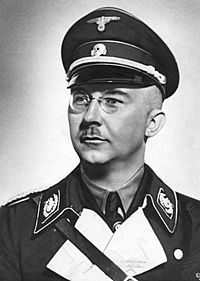
Over the years, Irving's stance on the Holocaust has changed significantly. Since at least the 1970s, he has either questioned or denied Hitler's involvement in the Holocaust and whether or not the Nazis had a plan to exterminate the Jews of Europe.
Racism and antisemitism
Although Irving denies being a racist, he has expressed racist and antisemitic sentiments, both publicly and privately.
Persona non grata
After Irving denied the Holocaust in two speeches given in Austria in 1989, the Austrian government issued an arrest warrant for him and barred him from entering the country. In early 1992, a German court found him guilty of Holocaust denial under the Auschwitzlüge section of the law against Volksverhetzung (a failed appeal by Irving would see the fine rise from 10,000 DM to 30,000 DM), and he was subsequently barred from entering Germany. Other governments followed suit, including Italy and Canada, where he was arrested in November 1992 and deported to the United Kingdom. In an administrative hearing surrounding those events, he was found by the hearing office to have engaged in a "total fabrication" in telling a story of an exit from and return to Canada which would, for technical reasons, have made the original deportation order invalid. He was also barred from entering Australia in 1992, a ban he made five unsuccessful attempts to overturn.
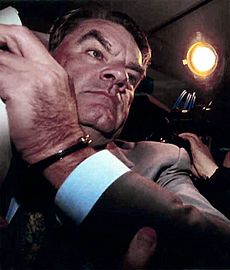
In 1992, Irving signed a contract with Macmillan Publishers for his biography of Joseph Goebbels titled Goebbels: Mastermind of the Third Reich. Following charges that Irving had selectively "edited" a recently discovered complete edition of Goebbels's diaries in Moscow, Macmillan cancelled the book deal. The decision by The Sunday Times (who had bought the rights to serialised extracts from the diaries before Macmillan published them) in July 1992 to hire Irving as a translator of Goebbels's diary was criticised by Austrian-British historian Peter G. J. Pulzer, who argued that Irving, because of his views about the Third Reich, was not the best man for the job. Andrew Neil, the editor of The Sunday Times, called Irving "reprehensible", but defended hiring him because he was only a "transcribing technician", which others criticised as a poor description of translation work.
On 27 April 1993, Irving was ordered to attend court to be examined on charges relating to the Loi Gayssot in France, making it an offence to question the existence or size of the category of crimes against humanity. The law does not extend to extradition, and Irving refused to travel to France. Then, in February 1994, Irving spent 10 days of a three-month sentence in London's Pentonville prison for contempt of court following a legal wrangling over publishing rights.
In 1995, St. Martin's Press of New York City agreed to publish the Goebbels biography: but after protests, they cancelled the contract, leaving Irving in a situation in which, according to D. D. Guttenplan, he was desperate for financial help, publicity, and the need to re-establish his reputation as a historian. The book was eventually self-published.
=Later life
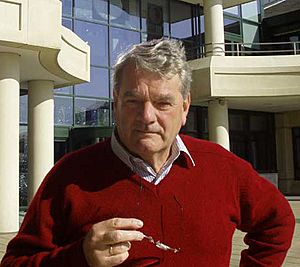
Early in September 2004, Michael Cullen, the Deputy Prime Minister of New Zealand, announced that Irving would not be permitted to visit the country, where he had been invited by the National Press Club to give a series of lectures under the heading "The Problems of Writing about World War II in a Free Society". The National Press Club defended its invitation of Irving, saying that it amounted not to an endorsement of his views, but rather an opportunity to question him. A government spokeswoman said that "people who have been deported from another country are refused entry" to New Zealand. Irving rejected the ban and attempted to board a Qantas flight for New Zealand from Los Angeles on 17 September 2004. He was not allowed on board.
On 11 November 2005, the Austrian police in the southern state of Styria, acting under the 1989 warrant, arrested Irving. Irving pleaded guilty to the charge of "trivialising, grossly playing down and denying the Holocaust". Irving stated in his plea that he had changed his opinions on the Holocaust, "I said that then based on my knowledge at the time, but by 1991 when I came across the Eichmann papers, I wasn't saying that anymore and I wouldn't say that now. The Nazis did murder millions of Jews." Irving had obtained the papers from Hugo Byttebier, a Belgian who had served in the SS during the war and had escaped to Argentina. Irving was sentenced to three years' imprisonment in accordance with the law prohibiting Nazi activities (Verbotsgesetz, "Prohibition Law"). Irving sat motionless as judge Peter Liebetreu asked him if he had understood the sentence, to which he replied "I'm not sure I do" before being escorted out of the court by Austrian police. Later, Irving said that he was shocked by the severity of the sentence. He had reportedly already purchased a plane ticket home to London.
In December 2006, Irving was released from prison and banned from ever returning to Austria. Since then, Irving has continued to work as a freelance writer, despite his troubled public image.
Irving established a website selling Nazi memorabilia in 2009. The items are offered by other people, with Irving receiving a commission from each sale for authenticating them. Irving stated in 2009 that the website was the only way he could make money after being bankrupted in 2002. Items sold through the website include Hitler's walking stick and a lock of the dictator's hair. Irving has also investigated the authenticity of bones purported to be from Hitler and Eva Braun.
During an interview with Johann Hari, Irving said that in the 1970s, Erwin Giesing, one of Hitler's doctors, had quoted Hitler to him thus: "One day, an Englishman will come along and write my biography. But it cannot be an English man of the present generation. They won't to [sic] be objective. It will have to be an Englishman of the next generation, and one who is totally familiar with all the German archives." Irving said that Giesing had identified him as the objective Englishman that Hitler had spoken of.
During the same interview, Irving claimed that various Nazis hid what was happening to the Jews from Hitler because he was "the best friend the Jews had in the Third Reich".
Personal life
In 1961, while living in Spain, Irving met and married a Spaniard, María del Pilar Stuyck. They have four children. They divorced in 1981. In 1992, Irving began a relationship with a Danish model, Bente Hogh. They have a daughter, born in 1994.
Irving's daughter Josephine suffered from schizophrenia. She was involved in a car crash in 1996 which resulted in her having to have both of her legs amputated. She died in September 1999, at the age of 32.
Illness
In February 2024, Irving's family announced that he had fallen ill while in Florida in October 2023 and "has been in declining health ever since", had been hospitalised for two months, and has returned to England but requires "round-the-clock care". The statement also says "It is with sadness that we must accept that David is now unable to engage in his life’s work".
Works
Books
- The Destruction of Dresden (1963) ISBN: 0-7057-0030-5, updated and revised 1995 as Apocalypse 1945, The Destruction of Dresden, further revised for 2007
- The Mare's Nest (1964)
- The Virus House (1967)
- The Destruction of Convoy PQ17 (1968), reprinted (1980) ISBN: 0-312-91152-1, updated in 2009.
- Accident – The Death of General Sikorski (1967) ISBN: 0-7183-0420-9
- Breach of Security (1968) ISBN: 0-7183-0101-3
- The Rise and Fall of the Luftwaffe (1973), a biography of Erhard Milch ISBN: 0-316-43238-5
- The Night the Dams Burst (1973): (in 3 parts).
- Hitler's War (1977), updated in 2000 as a millennium edition
- The Trail of the Fox (1977), a biography of Erwin Rommel ISBN: 0-525-22200-6, reissued 1999 in Wordsworth Military Library, ISBN: 1-84022-205-0
- The War Path (1978) ISBN: 0-670-74971-0
- The War Between the Generals (1981)
- Uprising! (1981), ISBN: 0-949667-91-9
- The Secret Diaries of Hitler's Doctor (1983) ISBN: 0-02-558250-X
- The German Atomic Bomb: The History of Nuclear Research in Nazi Germany (1968) ISBN: 0-671-28163-1
- Der Morgenthau Plan 1944–45 (in German only) (1986)
- War between the Generals (1986) ISBN: 0-86553-069-6, updated in 2010.
- Hess, the Missing Years (1987) Macmillan, ISBN: 0-333-45179-1
- Churchill's War (1987) ISBN: 0-947117-56-3: (in 4 parts).
- Göring (1989), biography of Hermann Göring ISBN: 0-688-06606-2, updated in 2010.
- Das Reich hört mit (in German only) (1989)
- Hitler's War (1991), revised edition, incorporating The War Path
- Der unbekannte Dr. Goebbels (in German only) (1995)
- Goebbels – Mastermind of the Third Reich biography of Joseph Goebbels (1996) ISBN: 1-872197-13-2, cleaned-up and corrected in 2014
- Nuremberg: The Last Battle (1996) ISBN: 1-872197-16-7
- Churchill's War Volume II: Triumph in Adversity (1997) ISBN: 1-872197-15-9: (in 3 parts)
- Hitler's War and the War Path (2002) ISBN: 1-872197-10-8
- True Himmler (2020) ISBN: 1-872197-83-3
Translations
- The Memoirs of Field-Marshal Keitel (1965)
- The Memoirs of General Gehlen (1972)
Monographs
- The Night the Dams Burst (1973)
- Von Guernica bis Vietnam (in German only) (1982)
- Die deutsche Ostgrenze (in German only) (1990)
- Banged Up (2008)
See also
 In Spanish: David Irving para niños
In Spanish: David Irving para niños
- Arthur Butz
- Faurisson affair
- Historical negationism
- Critical responses to David Irving


